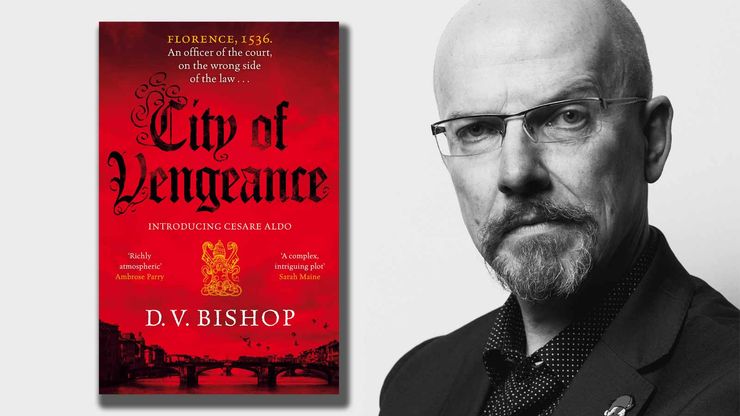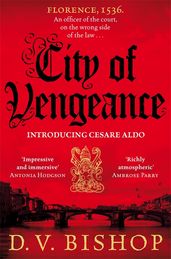D. V. Bishop on deception and lies in his historical thriller
D. V. Bishop’s thriller City of Vengeance is set in sixteenth-century Florence, a city of intrigue, lies and political machinations. Here he discusses the lies men tell in the novel – whether for power or protection.

City of Vengeance is the debut historical thriller from D. V. Bishop. The novel follows Cesare Aldo, an officer with the most feared criminal court in Florence – the Otto di Guardia e Balia – as he tries to solve the murder of a prominent Jewish moneylender. But Aldo has secrets of his own, secrets which could destroy him if uncovered. He must catch the killer before his private life is exposed and his life ruined, but he isn’t the only man lying to protect himself . . .
Here, D. V. Bishop tells us more about the dark history of Florence which inspired City of Vengeance, and the web of lies which the male characters weave throughout the novel.
For more reading inspiration discover the best thriller books and the best crime fiction, as well as the best historical fiction of all time.
‘Anyone who seeks to deceive will always find someone who will allow himself to be deceived.’ So wrote Niccolò Machiavelli in The Prince, his sixteenth-century treatise on the maintenance of political power. Machiavelli’s book was intended as an instructional guide for princes and others new to leadership. Broadly speaking, it argues that the goal of retaining power justifies whatever means may be necessary to achieve this – including lies and deception.
It is no coincidence that Machiavelli was born in Florence and spent much of his life there. The cradle of the Renaissance is often associated with beautiful art and architecture, but it was also the site of numerous intrigues, assassinations and political machinations. Florence taught Machiavelli the power of lying, and that lies can help to sustain power. It was this backdrop that inspired my historical thriller, City of Vengeance.
The novel is set in the winter of 1536, just a few years after Machiavelli’s death and the posthumous publication of The Prince. Unlike other parts of Italy where the church dominates civic life, Florence is ruled by the Medici, a family that rose to power through banking and business. This makes Florentines, especially Florentine men, transactional people. The art of the deal is all-important and winning means doing whatever is needed.
As a consequence, one dominant theme emerges in City of Vengeance – the lies men tell to others and themselves. All the male characters in the novel are liars. Some do so as a form of protection, such as the central character Cesare Aldo. He is an officer with the most feared criminal court in Florence, the Otto di Guardia e Balia. But Aldo’s sexuality puts him on the wrong side of the law he enforces, so he must lie and deceive to survive.
Other men in the novel lie because it suits them, because it furthers their cause, or because they enjoy the power it brings. Duke Alessandro de’ Medici presents himself as the saviour of Florence after years of plague, siege and instability. Yet Alessandro routinely lies his way into bed with the wives and daughters of rich merchants. The duke’s cousin Lorenzino de’ Medici is even more duplicitous, a craven sycophant with murder in his heart and a knife behind his back. Both men can deceive without compunction or conscience, but if they catch someone else in a lie the consequences are calamitous.
The novel shows Renaissance Florence as a city built on banking, commerce and lies. The church considers moneylending a sin, so many merchants secretly turn to Jewish usurers for help while publicly treating all Jews with disdain. Sex working is legal in Florence but only if those supplying the needs of men register with the Office of Decency and work at a bordello in an ordained area. Keeping such things out of sight will keep them out of mind, according to the Office of Decency – yet another form of self-deception.
Alongside commerce and politics, it is sexuality that creates the most lies and liars in City of Vengeance. Much of the city turns a blind eye to men who enjoy the company of other men, so long as neither is married. Young men need their pleasures, and few young women are available outside a bordello. But after a man weds the follies of youth are forbidden and those who still seek out other men to satisfy their lusts will suffer. If found guilty of breaking such laws a man could be sentenced to hang, his body set alight on the gallows and the ashes thrown into the Arno to prevent a proper burial. No wonder so many tell lies.
The final words on this inevitably come from The Prince: ‘Men will always deceive you, unless they are kept honest by constraint.’ Machiavelli had seen for himself what could happen if the lies of men were not stopped. City of Vengeance shows the consequences of such deceptions being left to fester; the results are murderous and bloody…
City of Vengeance
by D. V. Bishop
Florence, 1536. When a prominent Jewish moneylender is found dead, Cesare Aldo, an officer of the criminal court, is tasked with solving his murder. Over the course of his investigation, Aldo uncovers a plot to overthrow the unstable ruler of Florence, Alessandro de’ Medici. Aldo is caught in a frantic race against time to solve the murder and stop the conspiracy, while keeping his own secrets safely locked away. This historical crime thriller is an exciting debut from D. V. Bishop.



